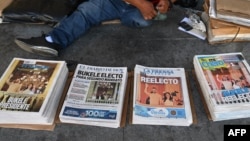The work of journalists in El Salvador is becoming tougher, with an increase in efforts to harass or block them from reporting in the past year, a media association says.
The Journalists Association of El Salvador, or APES, has recorded scores of cases of journalists being threatened for reporting on allegations of government corruption, blocked from covering events or targeted with surveillance software. It is also seeing female journalists subjected to online harassment and threats.
Overall, the association documented a 40% rise in attacks in 2023.
"We had a little more than 223 cases during 2023, which is a fairly high number. ... There was an increase of around 40%, compared to 2022," APES President Angelica Carcamo told VOA.
'An escalation of violence'
APES has documented multiple cases of journalists being restricted from covering voting or campaign events or blocked from taking photographs. In some cases, journalists are harassed online or targeted in smear campaigns designed to discredit them, or attacked.
Among the cases is that of freelance reporter Marvin Diaz.
Diaz says he was covering a vote count in San Salvador last month when a member of the ruling Nuevas Ideas party snatched his phone. Diaz said the party member was trying to stop him from documenting the final scrutiny of voting, even though the event was open to the press.
"There is an escalation of violence, an escalation of intimidation for the press," Diaz said.
But, he said, "Now more than ever, El Salvador needs journalists that denounce and document all the facts."
"What happened to me has been difficult, but it is not going to stop me from my work either," he added.
Center documents violations against media
With cases often increasing during election periods, APES set up a monitoring center to document any violations against media during the presidential vote in February and municipal elections in March.
Carcamo says in the month before the municipal vote, the organization documented dozens of violations.
Speaking at the U.S. Conservative Political Action Conference in Washington in February — shortly after he was reelected — President Nayib Bukele said his country has press freedom but that journalists have a responsibility.
"A democracy needs a free press, but to enjoy that membership you must do your duty as a reporter, report the facts and not be a puppet of those who finance them," Bukele said in his speech.
Part of the issue with media attacks, said APES, is impunity. Complaints are presented to the police or prosecutor's office, but the cases are rarely resolved.
El Salvador ranks 115th out of 180 countries on the World Press Freedom Index, where 1 reflects the best media environment. The media watchdog Reporters Without Borders says the country's reporters and media outlets are affected by violence but that Bukele has also harassed journalists critical of his government.
This article originated in VOA's Spanish Service.




